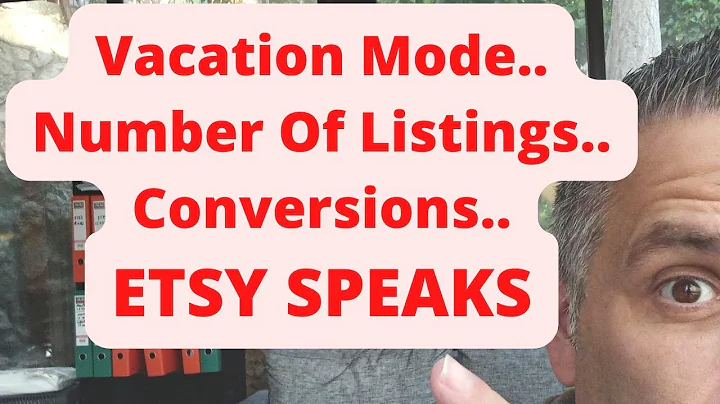Etsy's $1.6B Acquisition of Depop | What's the Impact?
Table of Contents
- Introduction
- Depop's acquisition by Etsy
- Depop remains a separate entity
- Benefits of Etsy's acquisition
- Validation of Depop's value
- Potential for growth and expansion
- Expertise in online marketplaces
- Seller concerns and possible outcomes
- Fear of increased seller fees
- Trust in Etsy as a company
- Impact on dropshipping and counterfeit items
- Unlikely changes to Depop's structure
- Maintaining a separate platform
- Focus on community and user experience
- Depop's potential for improvements
- Desired improvements and changes
- Headquarters in different countries
- Enhancing discount options
- Streamlining shipping process
- Conclusion
Depop's Acquisition by Etsy and Its Impact on Sellers
In June 2021, an exciting announcement was made that Etsy had officially acquired Depop, a popular online marketplace for second-hand clothing. This acquisition, valued at 1.62 billion dollars, sparked a lot of interest and raised several questions among Depop sellers. In this article, we will delve into the details of this acquisition and explore the potential impact it might have on the Depop platform.
Introduction
The email sent out by Depop informing sellers about the acquisition left many with mixed feelings. While some were optimistic about the news, others expressed concerns about potential changes to the platform or an increase in seller fees. To address these concerns, it is important to understand the nature of the acquisition and what it means for Depop as a separate entity.
Depop remains a separate entity
Despite the acquisition, Depop will continue to operate as a standalone business. It will remain its own separate app and website, with no plans of merging with Etsy. The current management team will also remain in place, suggesting that there won't be any major immediate changes to Depop's operations. This is good news for existing Depop users who enjoy its unique features and community.
Benefits of Etsy's acquisition
The acquisition of Depop by Etsy carries several potential benefits for both sellers and the platform as a whole. First and foremost, it serves as validation that Depop is a valuable marketplace for reselling used clothing. The fact that Etsy saw the potential in Depop shows that there is a growing market for second-hand fashion, which bodes well for Depop sellers.
Additionally, Etsy's expertise in online marketplaces, particularly in the realm of handmade goods, makes it a natural fit for Depop. While Depop specializes in second-hand clothing, its alignment with Etsy's values and focus on unique, artisanal products can open up new opportunities for collaboration and cross-promotion. This could potentially lead to increased exposure and sales for Depop sellers.
Seller concerns and possible outcomes
While the acquisition brings potential benefits, it is understandable that some sellers have concerns about the future of Depop under Etsy's ownership. Two common concerns raised are the possibility of increased seller fees and dissatisfaction with Etsy as a company.
It is worth noting that Depop's current fee structure, which deducts 10% for every sale, has been successful in attracting sellers due to its relatively low rate compared to competitors like Poshmark. While it is conceivable that Etsy might consider adjusting fees to increase profitability, it is unlikely to do so in the near future. Depop's success and appeal as a platform rely on its affordability for sellers, and any significant fee increase would risk driving sellers away.
Regarding Etsy as a company, there have been criticisms of the platform allowing mass-produced items and dropshipping. However, Depop has been proactive in addressing these issues, successfully curbing dropshipping on its platform. It is reasonable to expect that Etsy, recognizing the value of Depop's community, will prioritize maintaining and enhancing the platform's unique identity and community focus.
Unlikely changes to Depop's structure
Given Depop's distinct appeal and community-driven nature, it is unlikely that Etsy will make substantial changes to its structure. Depop will continue as a separate website and app, distinguishing itself from other online marketplaces. The ability to maintain its independent status makes Depop an attractive platform for sellers and buyers searching for a unique and inclusive community.
Depop's success has been driven by its user-centric approach and the passion of its community. Etsy's acquisition demonstrates an understanding of Depop's value and the importance of preserving its core features. Therefore, it is reasonable to expect that Etsy will prioritize maintaining what has made Depop successful while looking for ways to enhance the platform.
Desired improvements and changes
While the acquisition by Etsy suggests a positive future for Depop, there are areas where the platform could benefit from improvements. These changes would not only address long-standing seller concerns but also enhance the overall user experience.
One significant improvement would be establishing more headquarters in different countries, including Canada and other regions that currently lack comprehensive support. This would ensure that sellers from all countries have equal opportunities for exposure and promotion on the platform. Increasing international visibility will lead to a broader customer base and more sales for sellers worldwide.
Another improvement that sellers would appreciate is a better system for providing discounts. While Depop allows for some discount options, introducing more flexibility, such as tiered discounts based on bundle purchases, would incentivize buyers and increase sales. By encouraging the creation of bundles, Depop can further distinguish itself from competitors and enhance the overall shopping experience.
Lastly, addressing the issue of shipping costs is crucial for sellers, particularly in countries like Canada where shipping expenses can be exorbitant. Partnering with local postal services, like Canada Post, to negotiate more affordable shipping rates would alleviate the financial burden on sellers. While maintaining the option for self-shipping is important, offering more competitive shipping rates would make Depop a more accessible and lucrative platform for sellers.
Conclusion
The acquisition of Depop by Etsy brings exciting possibilities for the platform's future while also raising some understandable concerns. However, considering Depop's successful track record, Etsy's understanding of Depop's value, and the shared goal of supporting the community, it is unlikely that drastic changes or negative outcomes will occur.
Sellers should remain optimistic about the potential for growth and improvements under Etsy's ownership. The acquisition validates the market value of Depop, and sellers can look forward to enhanced promotional opportunities, increased visibility, and potential advancements in areas such as discounts and shipping.
As the acquisition progresses and Depop evolves, it is crucial for both Depop and Etsy to listen to the concerns and suggestions of their users. By prioritizing the needs of the community, the acquisition can lead to an even stronger and more successful platform for both buyers and sellers alike.
 WHY YOU SHOULD CHOOSE Etsyshop
WHY YOU SHOULD CHOOSE Etsyshop









